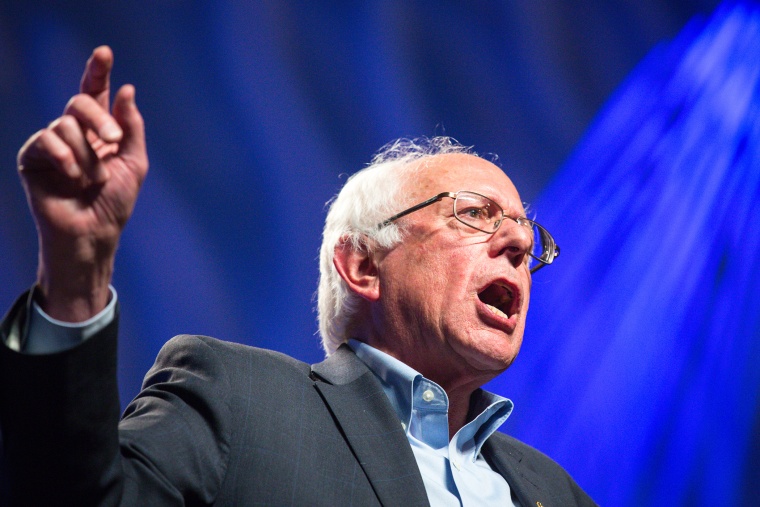Last September, facing an unexpectedly tough re-election fight, Sen. Pat Roberts was getting a little desperate. The Kansas Republican, struggling in the polls, decided the way to hold onto his seat was to become as brazenly right-wing as possible,
telling one audience, "We have to change course because our country is heading for national socialism."
It was a curious moment. Pat Roberts, after spending more than three decades on Capitol Hill, was either arguing that America is headed towards Nazism or was using the phrase "national socialism" without knowing what it means.
About a year later, the phrase has popped up once more.
National Review, ostensibly one of the leading media outlets in U.S. conservatism,
published this piece from Kevin Williiamson about Sen. Bernie Sanders' (I-Vt.) presidential campaign.
In the Bernieverse, there's a whole lot of nationalism mixed up in the socialism. He is, in fact, leading a national-socialist movement, which is a queasy and uncomfortable thing to write about a man who is the son of Jewish immigrants from Poland and whose family was murdered in the Holocaust. But there is no other way to characterize his views and his politics.
Is that so. When describing the Vermont senator's liberal approach to politics, Williiamson and National Review are effectively powerless -- they must reference national socialism. There is, the author assures us, "no other way."
Remember, unlike Pat Roberts, Williiamson isn't just throwing the phrase around unknowingly. This is deliberate -- the conservative is connecting the liberal candidate to the phrase most commonly associated with the Nazi's political system.
That members of Sanders' family were murdered during the Holocaust apparently didn't stop Williiamson -- or his editors, or the fact-checkers, or the publishers -- from making the connection anyway.
Indeed, the
same piece goes on to say Sanders would like to criminalize dissent.
His pose is not the traditional progressive managerial-empiricist posture but a moral one. He is very fond of the word "moral" -- "moral imperative," "moral disaster," "moral crisis" -- and those who see the world differently are not, in his estimate, guilty of misunderstanding, or ignorance, or bad judgment: They are guilty of "crimes." And criminalizing things is very much on Bernie's agenda, beginning with the criminalization of political dissent. At every event he swears to introduce a constitutional amendment reversing Supreme Court decisions that affirmed the free-speech protections of people and organizations filming documentaries, organizing Web campaigns, and airing television commercials in the hopes of influencing elections or public attitudes toward public issues. That this would amount to a repeal of the First Amendment does not trouble Bernie at all. If the First Amendment enables Them, then the First Amendment has got to go.
Sanders and his supporters will very likely find this criticism infuriating, and with good reason. But what's striking to me is the fact that the criticism exists at all.
It wasn't long ago that the Republican establishment and conservative media were content to ignore Sanders and his ideas. If his name came up at all, it was used as a punch-line -- Sanders was a liberal caricature, not to be taken seriously.
That's obviously changed. As Sanders' crowds grow and his poll standing improves, the Vermonter has positioned himself as worthy of National Review condemnation. To be sure, it's unpersuasive, needlessly provocative condemnation, but it's also evidence of a prominent national figure whom the right is no longer inclined to discount as irrelevant.
